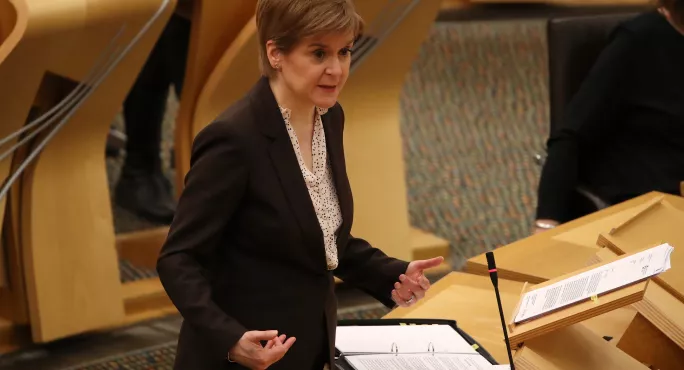7 key messages for schools from Sturgeon statement

This afternoon Scotland’s first minister, Nicola Sturgeon, announced that schools will remain closed to the majority of pupils until at least Monday 1 February, as she set out plans for a second national lockdown “similar to the lockdown of March last year”.
Here is key information for schools contained in Ms Sturgeon’s statement and the questions that followed, including her hope that she can “accelerate” a vaccination programme for school staff, and why understanding how the new variant of the coronavirus is transmitted among young people will be critical to schools reopening.
Coronavirus: Nicola Sturgeon’s announcement on school closures
1. All schools will remained closed to the majority of pupils until 1 February, with the exception of vulnerable children and the children of key workers.
2. That decision will be reviewed on 18 January.
3. The decision to keep school buildings closed until at least 1 February was “the most difficult of all”, said Ms Sturgeon. But it was made for two main reasons: high levels of community transmission of the coronavirus, and uncertainty among the scientific community about the impact of the new variant on transmission among young people.
4. The move to remote learning will be as short as possible, Ms Sturgeon said, and different sectors or areas could return at different times. The first minister said that island communities were having to close their schools - despite remaining in a lower alert level of tier 3 - because of the uncertainty around the transmission of the new strain among young people. She said, though, that when it came to reviewing the decision to close schools, it would not be a binary open or closed decision, adding: “If we can get some pupils back ahead of all pupils, that’s what we will do. Obviously one of the things we will be looking at is whether primary schools can come back even before we felt it safe to bring secondary schools back.”
5. Ms Sturgeon agreed with the Greens’ Patrick Harvie that there would have to be answers about the question of transmission among young people before schools could be reopened. But she stressed there was “no evidence at all” that the new strain of the coronavirus was leading to more serious illness among young people and there was “no conclusive evidence” it was more likely to infect young people.
She added: “But there are some uncertainties around the impact it has and whether, even if it’s not leading to greater infection risks within groups of young people, they may be more likely to carry it and infect older people, whether that’s parents or teachers.
“It’s important that we give ourselves the time for the scientific community to come to a more certain view of that.”
6. Ms Sturgeon said she would be having discussions about how to “accelerate” the process of getting school staff vaccinated to give them greater reassurance when schools reopened.
However, she made it clear that the clinical advice was to prioritise those most at risk of getting ill and dying from the coronavirus.
She said: “Ethically, we have a duty to make sure we use the supplies we have to do that first. Many teachers will be in those groups - teachers over 50, or teachers under 50 who have other health conditions. But beyond that we want to get teachers vaccinated, and school staff generally vaccinated, as soon as possible, but we must make sure we are following the advice about those most clinically in need.”
7. Asked if teachers should plan to go into school, or not this week, Ms Sturgeon said: “We would expect teachers to still be in schools to help with the provision of key worker and vulnerable children but my key advice to teachers, of course, is to take their guidance from their employer, which is their individual school and local authority.”
Register with Tes and you can read two free articles every month plus you'll have access to our range of award-winning newsletters.
Keep reading with our special offer!
You’ve reached your limit of free articles this month.
- Unlimited access to all Tes magazine content
- Save your favourite articles and gift them to your colleagues
- Exclusive subscriber-only stories
- Over 200,000 archived articles
- Unlimited access to all Tes magazine content
- Save your favourite articles and gift them to your colleagues
- Exclusive subscriber-only stories
- Over 200,000 archived articles